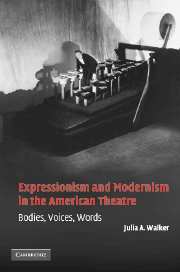Book contents
- Frontmatter
- Contents
- List of illustrations
- Acknowledgments
- Part I Introduction
- Part II Introduction
- 4 The “unconscious autobiography” of Eugene O'Neill
- 5 Elmer Rice and the cinematic imagination
- 6 “I love a parade!”: John Howard Lawson's minstrel burlesque of the American Dream
- 7 Sophie Treadwell's “pretty hands”
- Epilogue: “modern times”
- Notes
- Works cited
- Index
7 - Sophie Treadwell's “pretty hands”
Published online by Cambridge University Press: 22 September 2009
- Frontmatter
- Contents
- List of illustrations
- Acknowledgments
- Part I Introduction
- Part II Introduction
- 4 The “unconscious autobiography” of Eugene O'Neill
- 5 Elmer Rice and the cinematic imagination
- 6 “I love a parade!”: John Howard Lawson's minstrel burlesque of the American Dream
- 7 Sophie Treadwell's “pretty hands”
- Epilogue: “modern times”
- Notes
- Works cited
- Index
Summary
Eight months before graduating from the university of California at Berkeley in 1906, Sophie Treadwell took a leave of absence due to nervous exhaustion (Dickey, “Expressionist” 67). The reasons why are unclear. Perhaps her ministrations to victims of the San Francisco earthquake had simply taken their toll. Perhaps the prospect of graduation – and the uncertainties that loomed ahead – proved overwhelming to a woman who had thoroughly enjoyed her college career. Perhaps a love affair had ended badly. What we do know is that Treadwell retreated to the mountains of California, eventually finding work as a schoolteacher at a camp called Yankee Jim's. Over the next several years, Treadwell held a series of odd jobs, working as a governess for two girls on a cattle ranch, an actor in a vaudeville play, and an amanuensis for the actor Helena Modjeska, all the while trying to find time to write her own plays. Financial uncertainties, however, constantly threatened to undermine her independence and her health; suffering another nervous breakdown in September 1909, Treadwell retired again to Yankee Jim's “to find peace” (Wynn 33). Although little evidence survives from this period in her life, a few letters between Treadwell and her mother, Nettie, survive. They indicate that exacerbating – if not causing – Treadwell's condition was the relationship she had with her mother, an emotionally needy woman who relied upon her daughter's support after her marriage to Treadwell's father failed.
- Type
- Chapter
- Information
- Expressionism and Modernism in the American TheatreBodies, Voices, Words, pp. 211 - 238Publisher: Cambridge University PressPrint publication year: 2005

